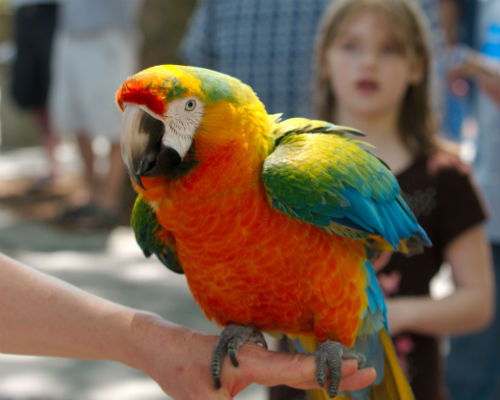
Learn How To Care For Your Parrot
Parrots make fascinating pets but can be particularly challenging to look after. They can live to a very good age and are therefore a long term commitment.
Your Parrot’s Home
Generally speaking, birds are quite social and will enjoy living in parts of the home that are well frequented. They will be isolated and unhappy if their cage is in a room that is rarely used. This location should also receive a good degree of natural light, with some access to shade too.
Your parrot’s cage should be large, with plenty of room to stretch their wings. As a general rule of thumb, it should be at least twice as wide as your bird’s wingspan (when their wings are fully extended). For large parrots, an aviary will be a better option compared to a cage. There should be ample climbing opportunities within the cage to keep your bird amused and stimulated. Ideally, it should include natural perches such as sycamore branches, which are changed frequently. The floor can be lined with newspaper.
You should allow your parrot time out of their cage at least per day but always supervise them during this playtime. Most birds will happily chew anything that they come into contact with so you will want to make sure that they cannot chew dangerous items.
Birds can be quite messy and you will need to take this into consideration. For example, food and water bowls should not be placed underneath their perch(es) so that droppings do not have opportunity to fall into them. Food and water bowls will need to be changed on a daily basis and their cage should be cleaned at least once per week. Be aware that there is a good chance that your parrot will defecate while out of their cage. This is to be expected so you should be prepared to have to clean up after them.
Feeding Your Parrot
In the wild, parrots have a varied diet and will eat a range of fruits, nuts and seeds. The majority of their diet should be made up of fruit, whole grains, vegetables and legumes. Nuts and seeds can be high in fat so they should not be fed in large quantities and should be seen as more of a treat than a mainstay of your parrot’s diet. Seeds and nuts should account for no more than half of their daily diet. Specific dietary requirements can vary with breed, so this should be researched for any special needs.
Grooming Your Parrot
Provide a bowl of plain water that is large enough for your parrot to bathe itself. This is important to maintain good plumage and prevent oil build up.
Health Concerns
You should take your parrot for regular vet check-ups, even if they appear to be in good health.
Most vets are not experts at treating birds, which will be problematic if your parrot falls ill. It is wise to look for an appropriate vet before you bring your parrot home or as soon as possible after this. If you wait until your parrot becomes ill, it could be difficult to find the right vet and the delay in getting treatment could potentially prove fatal.
Look out for warning signs such as fluffed-up feathers, resting their head on their wing, a thin breast bone, loose droppings, heavy breathing and nasal discharge. If your parrot starts to display these symptoms get in touch with a vet with specialist knowledge of birds as soon as possible.
Thoroughly research what will be needed to look after a parrot before deciding if this is the right pet for you.
[Photo Credit: Derrick Coetzee]